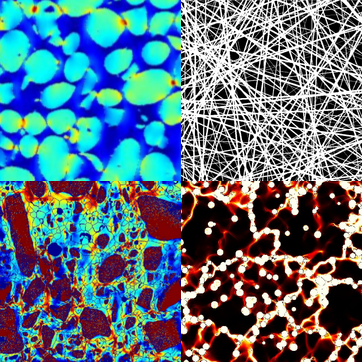
Keywords: random structures, variability, simulations, homogenization, upscaling, elasticity, fracture statistics, reliability, computer aided design of materials, FFT methods
Lecturers:
- Anne Françoise Gourgues, Centre des Matériaux P.M. Fourt, École des Mines de Paris, Evry.
- Christian Lantuejoul, Centre de Géosciences, École des Mines de Paris, 35 rue St Honoré, 77300 Fontainebleau.
- Benoit Noetinger, Institut Français du Pétrole Énergies Nouvelles, 78 Rueil Malmaison.
- Yves-Patrick Pellegrini, CEA DAM, Bruyères-le-Châtel, 91297 Arpajon.
- Bruno Figliuzzi, Centre de Morphologie Mathématique, École des Mines de Paris, 35 rue St Honoré, 77300 Fontainebleau.
- François Willot, Centre de Morphologie Mathématique, École des Mines de Paris, 35 rue St Honoré, 77300 Fontainebleau.
Organiser: François Willot (francois.willot@mines-paristech.fr, phone: +33 (0)1 64 69 48 07)
Time and location: November of each year, École des Mines de Paris (60 Bd Saint-Michel, Paris)
Participants: 30 maximum
Language of the courses: English
Subscription: 0€ (Mines Paris members), 850€ (students), 1,700€ (Profs, researchers, others). For more information, please contact Anne-Marie de Castro (anne-marie.de_castro@mines-paristech.fr)